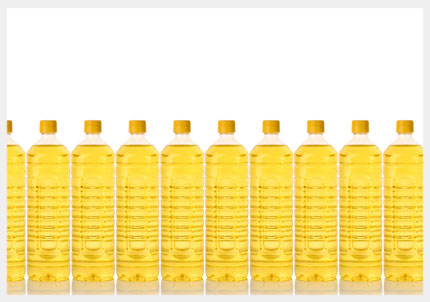Mustard Oil

Mustards are part of the oilseed family and are regarded both as a spice and as oilseeds. It is used widely in Eastern parts of India and Bangladesh. The oil, for the most part, contains fatty acids like oleic acids, linoleic acid and erucic acid. It has the lowest amount of saturated fats in its composition and thus is good for the heart and overall health. It is used to make vegetable oil or is further processed into the making of essential oil.
The oil is made by pressing of the seeds or by the process of grinding, whereby it is mixed with water and then further distilled. Thirty percent of the mustard seeds is composed of oil. Many countries consider mustard oil as unsuitable for human consumption as it has a high content of a substance known as erucic acid which is harmful to the body but now mustard oils with lower erucic acids are also available.
Mustard is an annual crop. Mustard plant is charachterised by yellowish green leaves and round stems with long inter-nodes. The grayish brown seeds are tiny and round in shape and on reacting with water emit a strong smell The mustard seeds are contained in small pods from where they are extracted. Mustard oil is being increasingly promoted by doctors and other health professionals who highlight the goodness of the oil for health and the heart. Mustard oils are available in the natural dark brown pungent variety and other variety available is the refined oil which is translucent and viscous.
Varieties of Mustards
India is a major producer of mustard and oilseeds in general. There are three main varieties of mustards in the world. Black mustard oil, white mustard oil and Brown mustard oils are the main varieties. Black mustard oil or Banarasi Rai is derived from black mustards and has a spicy and pungent flavour and aroma. Brown Indian mustard is another type of mustard which is grown traditionally in India but is now grown in other places too.. White mustard or safaid rai is decidedly pungent as it contains particular substances. Producing yellow flowers, It has a hairy stem and the seeds of the plant are large and white. Black mustard is self sterile and as it grows well in temperate climates. it has been grown in Europe since the 13 th century.. It has recently been introduced for cultivation more recently in the northern half of the country. Alba and Hirta are two types of mustard varieties grown in southern Europe and West Asia. they are grown during the winter times in Northern India alone as the climate is suitable for it.
Mustard has high commercial value and the mustard is the principal oilseed grown in India. While some varieties yield more oil, others are more pungent in taste. Traditionally, oil extraction took place using the oil ghani technology. The cold pressing technology is used here and therefore, it is more highly valued and priced. Mustards are used as fuels also and they are used in the production of biofuels as it is renewable. After extraction of the oil, the remaining part can be utilised effectively as pesticide.
Application
- Mustard oil is used for cooking purposes, for salad dressings and to marinate meat before cooking it. It is heated well before cooking to remove the harmful acids and the strong smells.
- It is also used as preservative for pickling purposes and for chutneys and other similar elaborate items.
- The oils are also utilised for preparation of home made cosmetics and beauty aids which are used to improve skin and hair.
- There is a culturally significance attached to mustard oil and it is used on important occasions such as weddings.
- It is used as fuels in some cases also.
- Parboiled Basmati Rice
- It is used as an essential oil as it has anti bacterial, appetite inducing, vitalizing qualities. and stimulant qualities.
Uses and Benefits of mustard oil
Though it is said the mustard oil contains harmful substances like erucic acid, it has been used for centuries in India and offers a plethora of health benefits to its users. Mustard oil is low in saturated fats. Saturated fats which clogs the arteries and cause heart attacks, hypertension and blood pressure. It is rich in natural antioxidants and Vitamin E and other vitamins, fatty acids like Omegs 3, and Omega 6 fatty acids. It can reduce cholesterol levels. It has various medicinal properties too and is antibacterial in nature and fights infections. Mustard Oil has anti fungal properties. This is due to the presence of the substance, Glucosinolate.
